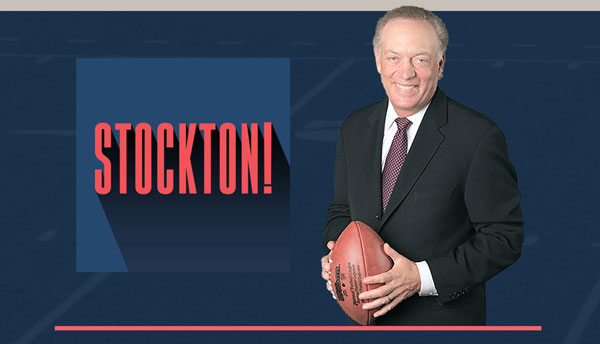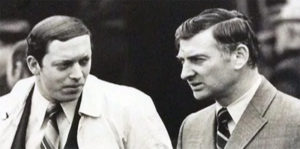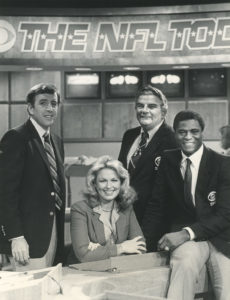Doors that Opened the Beginning of my NFL Career
There’s a twitter called, laughingly, but real, Un/Necessary Sports Research. It revealed on September 9th, that my season opening telecast of the Seahawks and Broncos was number 600.
It went on to reveal that, only Al Michaels who was about to announce his 642nd on that Sunday night game, had more.
Al had no idea, as neither did anyone else, of that milestone.
It won’t go down with Joe DiMaggio’s 56-game hitting streak, or Cal Ripken’s record 2,632 consecutive games played, but it provoked much joking by my Fox production team, that apparently someone at Fox wanted me to continue to try and get it right.
I regard this truly “unnecessary” nugget as a tribute to the hundreds of colleagues I’ve worked with through the years, great fortune, but mostly, a true blessing.
It also opened the door to the beginnings of my NFL career, which began at CBS Sports.
I had no idea it would come to this, especially when I became Sports Director at KDKA-TV in Pittsburgh, in 1967, reporting sports on the evening newscasts at 6, 7 and 11pm.
Early on, at KDKA, I established a solid relationship, and friendship with the Pittsburgh Steelers, particularly Art Rooney, the patriarch and founder of the club, and his son Dan.
I have talked of the extraordinary, sincere warmth of the people of Pittsburgh. When I’m asked where the friendliest folks are in my travels for five decades I don’t hesitate.
It’s Pittsburgh!
And it was exemplified by the Rooney family. Dan Rooney, who was about to take over the actual running of the club was more my contemporary. Dan was 10-years my senior, and we were friends.
Unbeknownst to me, the Rooneys called the President of CBS Sports, Bill MacPhail, and suggested they take a look at my work for possible use on the network.
Dan Rooney and me
One of my greatest thrills came when CBS called and in 1967, asked me to work as a pre and post game announcer on a few of their NFL broadcasts.
Keep in mind, this was almost a decade before the advent of the first and best pre-game studio show, The NFL Today.
CBS pre-game studio show, The NFL Today.
That show was the start of what is a common airing of programs in a studio with a panel previewing the day’s games and other NFL features. Many of them today, begin two hours before the actual game telecasts.
The NFL Today, the creation of Bob Wussler, a true TV programming “genius”, was a brilliant way of kicking off a Sunday of NFL football.
It featured host Brent Musburger, and included Phyllis George, Jimmy the Greek, and Irv Cross.
It was an ideal cast. Musburger, was a smart, enthusiastic journalist who kept things moving throughout the show. George was a former Miss America, who offered an appeal to both men and women, and conducted interviews with players, accenting the non-football aspects of their lives.
Jimmy the Greek was a no nonsense observer, who specialized in the subtle form of point-spreads and who he thought were the favorites to either win or cover the spread.
Irv Cross was the ex-player. Cross talked football strategy and what was actually happening down on the field.
Wussler, who was a top broadcasting executive for decades, and had already served as the producer of CBS’ election night coverage, and the space shots, handled by the legendary anchor
Walter Cronkite. The NFL Today was truly, one of the greatest pioneer shows in sports television.
But before that national program, the pre and mostly post game shows were broadcast from the various stadiums around the NFL.
Thus, each broadcast team had a third member. Much like they do today, with sideline reporters.
So, my first network exposure of any kind, was as the reporter at the stadium.
Here’s how my assignment worked: I would open the telecast with a short report from the field, then throw it to the play-by-play and color announcers in the booth.
There would be a half-time report done from deep down in the bowels of the stadium, in front of a wooden set, that was easily constructed from big boxes that were sent to the various locations each week. You can imagine how damp and cold it was in a dark location away from the actual field. And that was when it was hot and sunny outside.
When it really got cold in a city, you felt you were at the North Pole.
There were no scripts, and no teleprompters. It was pure ad-libbing of details and highlights of the game at halftime and an update of scores of other games.
The post game show lasted 15 minutes. An opening summary of the program, an update of the scores, highlights of the game we were covering, interviews with one or more of members of the winning team, and concluding with the latest standings around the league.
The set featured movable triangle panels which would be moved by the announcer. More than a few times, when I pushed in one of the triangles, you could see a stage-hand hiding in the corner eating a ham sandwich. Sophisticated it was not.
One time, during the post game show in Detroit, our set was actually in a large restroom. It was cut off from use by outsiders, of course, but I recall during a scoring update, the sound of a toilet flushing which went out over the air. Yes, sophisticated it was not.
I was deeply appreciate to get these assignments. For one, it gave me experience in learning to make sense without a script, learning to write in your head, and quickly install in your memory, specific facts from all the games around the league. It also gave me an opportunity to meet the great play-by-play broadcasters and analysts from that time.
My first game was in Pittsburgh. Opening day of the 1967 season. The Bears were playing the Steelers. Here I was, a 24-year old kid, just getting his feet wet in the business, at a hotel production meeting with the legendary Lindsay Nelson and former Bears star, George Connor.
I’ve talked of my love for the New York Football Giants growing up and how I worshiped the likes of Frank Gifford.
In one of my assignments that first season was working a Giants-Steelers game at Pitt Stadium.
The game was being shown in New York and the announcers were Jack Whitaker and Frank Gifford. Whitaker, one of the brilliant wordsmiths in sports television history, was the host of CBS’ golf coverage. We all know Gifford.
To be working with them, and know your parents and friends would see you for the first time, was probably the first moment I realized I had taken a giant step in my career.
Here’s something else I’ll never forget.
Whitaker, Gifford and yours truly were covering a Giants-Redskins game in DC.
Here I was, at the dining room in the famed Madison Hotel, not far from the White House, for our dinner with the producer and director and the public relations directors of each team.
Jack Whitaker
Naturally I wanted to fit in. Be one of the boys, even though I was in my mid-twenties and had not even touched the surface of the experience everyone at that table had known.
When the waiter came around for the drink order, Whitaker calmly said, ” I’ll have a House of Lords gibson on the rocks, please”.
Then came my turn. Having had only a beer or two in my life before that, I replied, “I’ll have the same, please”.
A House of Lords gibson is a glass of straight gin served with small onions.
I found out quickly that I was out of my league.
Halfway though, the room was spinning.
After awhile, the waiter came around and asked if anyone wanted another before dinner. Whitaker nodded. So did I.
To make a long story short, I didn’t recall anything other than, when I went to my room after dinner, I walked in with the lights on, and fell on the bed fully clothed. and woke up the next morning, lights on, fully clothed. I had to get ready for work.
I learned an important lesson. There are other ways to show your colleagues you’re one of the boys.
After a few years of working the post game shows, I moved into play-by-play.
Having worked with, and getting to know, many of the great players and coaches in NFL history has been my foremost memory of my profession.
At some time I will discuss many of them specifically.
As for now, I simply look back after 604 NFL play-by-play broadcasts, and what came before, having taken nothing for granted.
But with immense gratitude.




